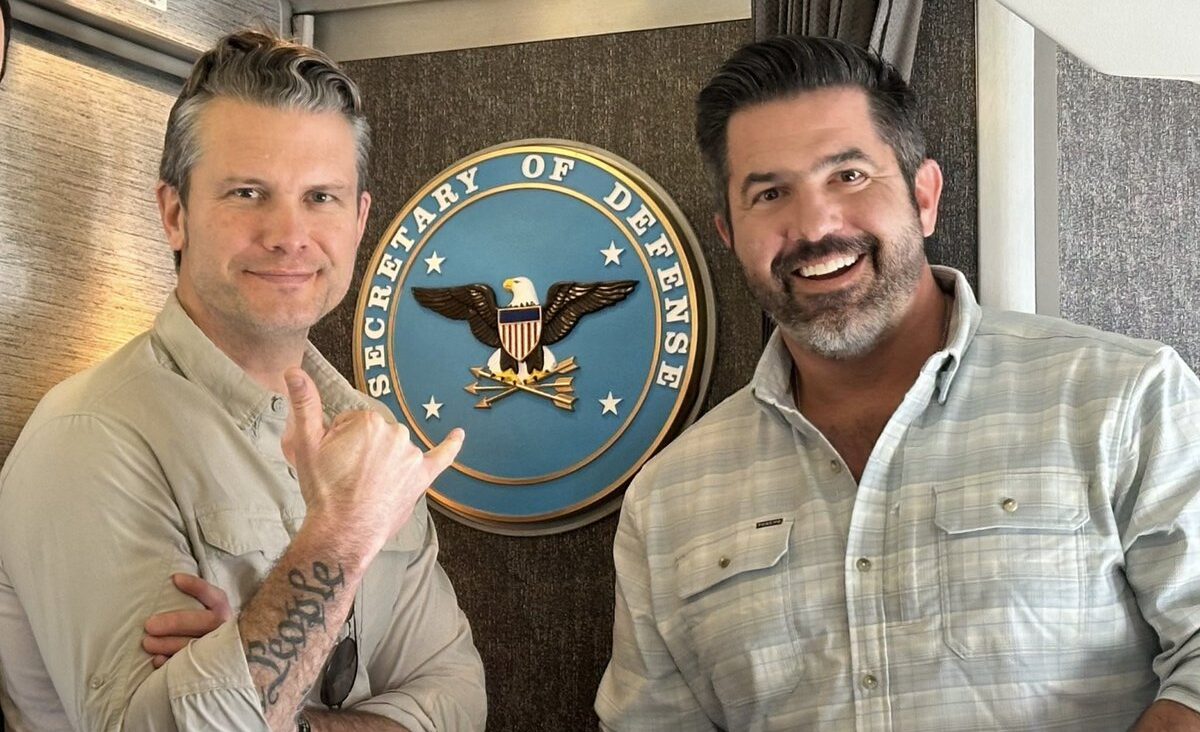Pentagon Spokesman’s Meeting With Reporters Devolves Into Chaos As He Demands To Know If They’re ‘Rooting’ For Trump: Report

Screenshot via Sean Parnell on X.
Chief Pentagon spokesman Sean Parnell had an off-the-record meeting with reporters Thursday afternoon that did not go well, according to a report by Status newsletter scribe Oliver Darcy.
The gathering included “a few dozen journalists” who had been covering the U.S. military “for many years,” Darcy reported, and was purportedly organized for Parnell to “introduce himself to the press corps” who were on the Pentagon beat.
Secretary of Defense Pete Hegseth made it through a rough confirmation process, getting grilled by Senate Democrats about various allegations of alcohol abuse and abusing women, his past controversial comments, and lack of experience. The former Fox News morning show host is widely viewed as getting the gig because his on-air personality and outspoken critiques of the military being too “woke” pleased President Donald Trump, and Hegseth has already made headlines for being snippy with reporters who questioned his decisions.
Parnell’s media confab came just a few weeks after the DOD booted The New York Times, CNN, NBC News, Politico, and NPR from their physical offices within the Pentagon and replaced them with more MAGA-friendly outlets like Breitbart and One America News Network, although the left-leaning Huffington Post was also included.
According to Darcy, who collected “first-hand accounts from reporters who were in the room and requested anonymity to relay the events that transpired because they are not authorized to publicly discuss the matter” to report on this story, Parnell started off on a cordial note, saying he hoped for a good relationship with the press.
“But the meeting quickly went off the rails” when the reporters started asking questions, and “things grew quite strange and adversarial” as Parnell began firing questions back at them. Reporters in the room told Darcy this was when Parnell’s “mask slipped” and the mood became “bleak and horrible.”
After some back-and-forth about a “rapid response” account on Elon Musk’s social media platform X that the DOD had deployed to criticize individual reporters, Parnell “then asked the room full of assembled journalists whether they were ‘rooting’ for the president to succeed.” Wrote Darcy:
When he was not given the answer he had hoped for, Parnell, clearly displeased, questioned why it would be unfair for him to expect that the reporters cheer on Trump. A reporter answered that it was not their job to root for or against a subject that they cover, but to simply report the facts.
Matters only grew worse from there. When a reporter asked why the Pentagon media affairs department was not responding to press inquiries in a timely manner, but rapidly firing off posts on X to slam reporters, Parnell quipped back, “So it’s our job to let you publish stories that trash the warfighter?” Again, reporters were bewildered and taken aback by the response. They wondered, what does Parnell mean when he accuses the press of trashing service members? Simply reporting information that the Pentagon doesn’t like?
Some reporters, I’m told, grew emotional over the accusation, noting that they have been covering the military for many years. They pointed out that in several cases it is often the reporters telling the warfighter what is actually happening. In other cases, strong reporting has spurred changes that have improved the lives of service members by exposing less-than-ideal conditions—whether overseas or at Walter Reed. One reporter in the room asked Parnell whether he had ever read their reporting. He indicated, in a snarky manner, that he had, suggesting that it revealed something terrible about who they are.
Another major point of contention was Parnell’s confirmation that the Pentagon would follow the White House’s lead in kicking out the “longstanding” rotating press pool and instead “shift toward handpicked access for ideological allies,” Darcy wrote.
One reporter who witnessed the meeting unfold told Darcy that it seemed like the Pentagon was “purposefully trying to discredit and paint any questioning of their policies as an attack on the troops.”
This shift in attitude towards the press under the Trump administration “isn’t about transparency—it’s about control,” wrote Darcy. “By excluding news outlets and granting access only to ideological allies, the administration isn’t just reshaping press relations; it’s attempting to reshape reality itself. The goal isn’t simply to avoid tough questions—it’s to ensure they are never asked in the first place.”





Comments
↓ Scroll down for comments ↓